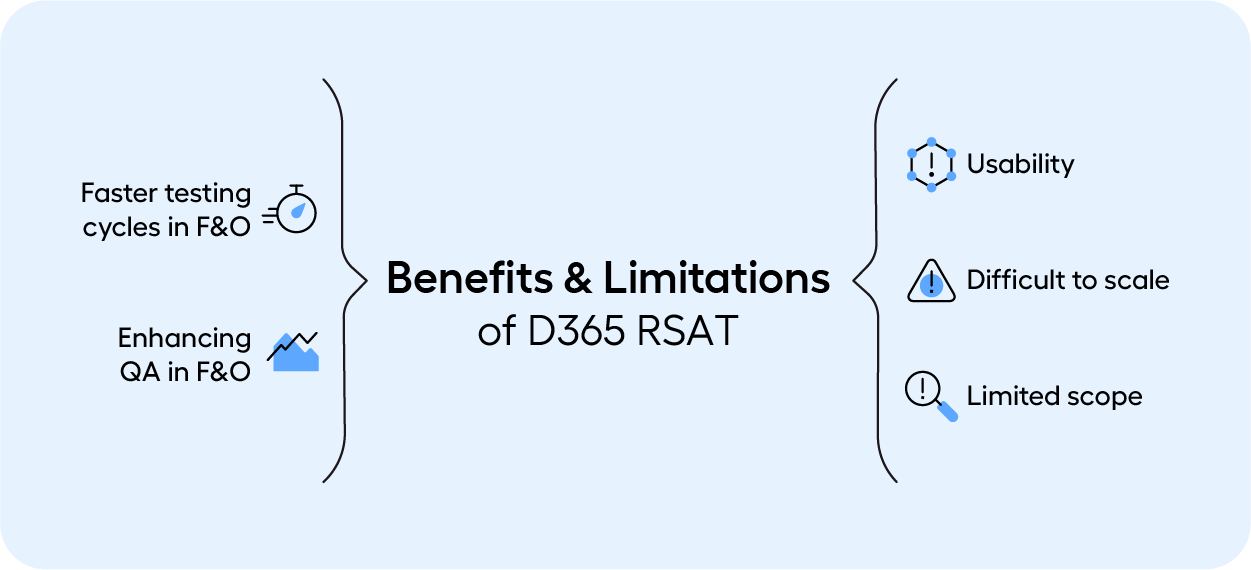Regression Testing in Dynamics: What, Why & How
What does it take to regression test Dynamics 365? How can you ensure high coverage without spending endless resources? This article will take you through key considerations to ensure the quality and performance of your Dynamics 365 applications through effective regression testing.
Why is regression testing in Dynamics 365 crucial?
In the world of software development, change is constant. With each update, enhancement, or bug fix to an application, there's always a possibility of unintended consequences or new defects.
Enter regression testing – the shield that safeguards the user experience and ensures that a software system remains intact with every change. And when it comes to Dynamics 365, regression testing takes on a vital role in maintaining quality and performance.
The role of regression testing in Dynamics 365 development
Regression testing is the practice of re-running a set of predefined test cases to verify that changes to an application have not negatively impacted existing functionalities. It acts as a safety net, preventing unexpected regressions from slipping into production and impacting users.
Manual regression testing, while valuable, is prone to human errors due to its repetitive nature.
Automating these tests not only ensures consistent execution but also enhances efficiency, accuracy, and speed.
Automating regression testing in Dynamics 365
Automating regression tests in Dynamics 365 offers numerous benefits:
- Repetitiveness and stability: Regression tests should be executed frequently. Automating these tests eliminates the need for manual repetition, reducing errors and maintaining consistent performance.
- Time and effort savings: Automating repetitive tests frees up valuable time for your QA team to focus on exploratory testing and other higher-value activities, while automation handles the repetitive tasks.
- Critical user experience: Regression tests typically cover core business processes that directly impact user experience. Automating these tests, and thereby ensuring frequent quality checks, minimizes the risk of user-facing issues and helps maintain a seamless user experience.
- Immediate Impact: Automating regression tests will help you yield quick benefits, building confidence in automation and setting the stage for further automation efforts.
Related reading: 8 Best Practices for Testing Dynamics
The limitations of Microsoft's regression testing tool RSAT
While Microsoft's Regression Suite Automation Tool (RSAT) offers a compelling solution for Dynamics 365 automation, it's important to recognize its limitations:
- Limited to D365 Finance & Operations: RSAT's application scope is limited to D365 Finance & Operations. You can't automate other applications. In an interconnected business environment, where processes span multiple applications and technologies, this means you can't to perform end-to-end testing and validate integrated business flows.
- Complex setup and maintenance: Setting up and configuring RSAT demands a cross-functional technical skill set. It requires not only an in-depth understanding of D365 Finance & Operations but also expertise in testing frameworks and coding. This skill combination is rare and challenging to find, making the setup and maintenance of RSAT resource-heavy.
- Difficult to maintain and scale: Like other automation frameworks, RSAT isn't immune to the impacts of change. Whenever D365 undergoes updates, releases, or modifications, RSAT test cases need to be adjusted accordingly. This translates to re-recording tests that break, a time-consuming process that requires technical know-how. As a result, maintaining RSAT tests becomes a continuous challenge, especially when updates are frequent.

In sum, the complexity of RSAT and its associated challenges can undermine the return on investment (ROI) from your testing automation efforts.
The time and resources required to set up, maintain, and navigate RSAT can overshadow the benefits it offers, making it a less attractive test automation solution for organizations seeking efficient and scalable testing solutions.
Instead, consider these RSAT alternatives, and read more about one of them, Leapwork, below.
Leapwork for efficient Dynamics 365 regression testing
As a strategic Microsoft test automation partner, Leapwork understands and meets the unique demands of D365-driven businesses. Here's how:
- Visual automation: Leapwork's visual test automation platform empowers both technical specialists and business experts to automate swiftly and seamlessly. Regardless of your team's background, you can get up and running with Leapwork in just 30 days.
- End-to-end process automation: Leapwork's capabilities span across different application types, covering everything from legacy on-premise systems to web applications. This ensures comprehensive coverage of your business processes, guaranteeing robust quality assurance.
- Business value-centric approach: Leapwork's customer success team is dedicated to helping you achieve your strategic goals and ensuring that your quality assurance efforts align with your business objectives.
- Low Maintenance, high efficiency: While some testing solutions require manual adjustments when UI changes occur, Leapwork's pre-built intelligent adaptors handle dynamic DOMs effortlessly. This means robust test cases with minimal maintenance, freeing you from the hassle of constant script editing.
By automating your Dynamics 365 regression testing, you not only mitigate risks and ensure consistent quality but also embrace innovation and agility.
Watch this Microsoft TechTalk, where they dig into regression testing across Dynamics 365 applications with Leapwork covering topics like its solution capabilities, DevOps integration, Order to Cash demo and more:
Learn more about how to approach regression testing in Dynamics 365 in our guide: How to Automate Dynamics 365 Testing.


